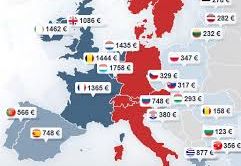- Business
- Childbirth & Education
- Legal Formalities
- Motoring
- Other
- Pensions & Benefits
- Property & Accommodation
- Taxes
- Airports and Airlines Spain
- Paramount Theme Park Murcia Spain
- Corvera International Airport Murcia Spain
- Join us for Tea on the Terrace
- When Expat Eyes Are Smiling
- Meet Wincham at The Homes, Gardens & Lifestyle Show, Calpe
- QROPS 2014
- Spain Increases IHT in Valencia & Murcia
- Removals to Spain v Exports from Spain
- The Charm of Seville
- Gibraltar Relations
- Retiro Park : Madrid
- Community Insurance in Spain
- Calendar Girls
- Considerations when Insuring your Boat in Spain
- QROPS – HMRC Introduces changes that create havoc in the market place
- QROPS – All Change From April 2012
- Liva & Laia : 15th November

The Spanish government admits that if a bill put forward by the leftist group Unidos Podemos to raise the minimum wage gets greenlighted by parliament, it will have no choice but to apply it. Although the ruling Popular Party (PP) opposes raising the minimum salary from €655.20 a month to €800 on January 1, 2018, there is no legal way to stop it, given that Prime Minister Mariano Rajoy is heading a minority government with no power to impose its views in a fragmented Congress.
The bill was introduced on Tuesday and will now go to committee, undergo amendments, return to the lower house and be referred to the Senate.
If the text passes in both houses, the government will have no choice but to enact it into law, admitted sources at La Moncloa, the seat of government.
If so, it will be the first opposition-sponsored initiative to be approved against the PP’s wishes and affecting economic policy.
Although the Constitution allows the executive to veto bills that could throw the budget off balance, Rajoy cannot fall back on this option because the wage hike would go into effect in 2018, and therefore does not affect the current public accounts.
Once the law is published in the Official State Gazette (BOE), the PP could lodge an appeal with the Constitutional Court, but this would not stop its going into effect.
Union leaders Pepe Álvarez of UGT and Ignacio F. Toxo of CCOO have repeatedly asked for a wage raise.
The bill still needs to overcome a series of hurdles, including differing viewpoints by the various opposition parties. At the amendment stage, the Socialist Party (PSOE) will ask for the wage raise to be more gradual, while regional pro-independence parties will request leeway to apply a different index depending on the region.
Rajoy and Labor Minister Fátima Báñez are scheduled to meet with union and employer representatives on Thursday to discuss the matter of minimum wages. Spain’s two major labor unions, CC OO and UGT, have been repeatedly demanding a quick hike to €800, followed by a more gradual raise to €1,000 (spread out over 14 monthly payments).
Recommended Reading :
* Number of Millionaires grows in Spain by 18% to 386,000 people
* Spanish Unions reject EU demands for budget adjustments










